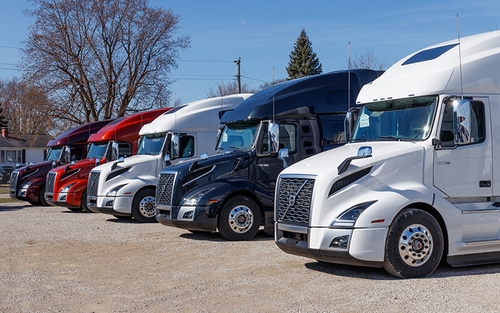Is being an owner-operator worth it? 8 pros and cons
April 26, 2023

Estimated reading time: 4 minutes
Starting and maintaining a trucking business as an owner-operator goes beyond making on-time deliveries. It requires business knowledge, driving experience and an understanding of regulations.
If you’re thinking of starting your own trucking company and are asking yourself, ‘is being an owner-operator worth it?’ continue reading to find out the pros and cons of owner-operator trucking.
Benefits of being an owner-operator
1. You gain independence.
One of the biggest benefits of being an owner-operator is being able to run your business how you want. Simply put, you’re your own boss.
This means you:
- Make your own business decisions.
- Pick loads for your business to haul.
- Decide whether you want to do business with a carrier or operate under your own authority.
- Choose what carrier you do business with.
- Determine if you’ll be the sole driver for your business, or if you'll hire additional employees.
2. You control your schedule.
As a business owner, you choose how you use your time. This is because, as an owner-operator, you:
- Create your own schedule based on freight availability.
- Choose the loads you want to haul.
- Pick where you do business.
- Decide how often you get home based on freight availability.
Having this freedom is beneficial if you want to attend important events with your family or take time off for a vacation. However, it's important to keep in mind that when you take time off, you are still responsible for paying all the fixed costs associated with your business.
3. You have the potential to earn more revenue.
There is no limit to how much you can make as an owner-operator. Exactly how much revenue an owner-operator generates depends on several factors, such as:
- How they set up their business model.
- What type of freight their business hauls.
- How often they provide freight services.
- How many trucks their business runs.
- What company they do business with (if they do business with a carrier).
- How good they are at managing their operating costs.
- Many other things.
Some owner-operators choose to do business with a carrier to take advantage of big carrier discounts. Schneider, for example, offers owner-operators discounts on things like:
- Fuel.
- Maintenance.
- Insurance.
- Tires.
- Safety footwear.
- Base plates and permits.
An owner-operator's earnings are largely dependent on how well they manage their expenses. Finding ways to save money on operating costs can help owner-operators pocket more of their profits.
4. You can operate the equipment you want.
As an owner-operator, you pick the equipment that works best for your business.
Think about all your must-haves for a truck and consider if you’d prefer:
- A truck with an automatic or manual transmission.
- A specific make of truck.
- A new or used truck.
- Additional features for safety and comfort.
Another benefit of being an owner-operator is that you can choose how you get the equipment your business will use. You can:
- Lease a brand-new or gently used truck from a place like SFI Trucks and Financing, or from any other equipment leaser.
- Buy used equipment from somewhere like Schneider Trucks.
- Purchase a new or used truck from a dealership or other vendor.
Challenges of being an owner-operator
5. You have more responsibility.
When weighing the pros and cons of being an owner-operator, you might want to consider the added responsibility that comes with running a business and driving a truck.
Owner-operators manage many tasks, including, among other things:
- Handling office work, like paperwork and scheduling.
- Knowing how to calculate cost per mile.
- Maintaining their equipment.
- Managing their fleet and employees.
- Tracking their business’ profit margins and expenses.
It’s up to you to decide if you’re ready to take on these extra responsibilities.
6. You oversee all expenses associated with your business.
Becoming an owner-operator requires a big financial investment. Owner-operators have both startup and ongoing expenses they need to budget for, such as:
- Business registration fees.
- Fuel.
- Insurance.
- Maintenance.
- Taxes.
- Truck payments.
It’s helpful to have a solid business plan to ensure you understand how much it costs to be an owner-operator. Ask yourself:
- How much money will my business need to earn to be profitable?
- How much money will my business need to pay monthly bills?
- How much money will my business need to set aside for unexpected maintenance costs?
- How much money will my business need if I take time off?
7. You need to find profitable freight for your business.
Unlike company drivers, owner-operators are responsible for finding and booking their own loads. Plus, they need to be adaptable to changing market conditions to stay profitable.
Since an owner-operator's profitability relies, among other reasons, on the quality of the loads their business hauls and the business sense used in choosing those loads, figuring out how to get loads is an important step in setting your business up for success.
Remember, what works for someone else’s business may not work for yours. It may take some trial and error before you find the most optimal option for your business.
8. You need to keep your business compliant.
Whether you run under your own authority or do business with a carrier, owner-operators are responsible for keeping their business compliant with regulations.
Staying compliant means, among other things:
- Understanding federal drug and alcohol policies.
- Meeting driver requirements, both for owner-operators and the drivers they employ.
- Keeping up with equipment maintenance.
- Following business and registration filings.
It's a good idea to stay up to date on the requirements laid out by the Federal Motor Carrier Safety Administration (FMCSA).



